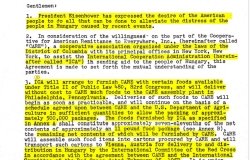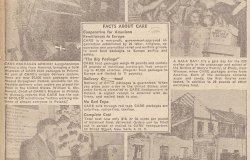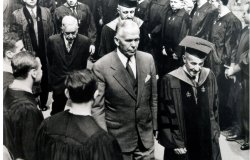Book Launch: "Looking Back at LBJ: White House Politics in a New Light"
Featuring Mitchell Lerner, Ohio State University; Mark Lawrence, University of Texas at Austin; David Shreve, University of Virginia; and Peter Hahn, Ohio State University
Overview
The Cold War International History Project and the Division of US Studies at the Woodrow Wilson Center invite you to join us in a book launch discussion on Looking Back at LBJ: White House Politics in a New Light, featuring Mitchell Lerner, Ohio State University; Mark Lawrence, University of Texas at Austin; David Shreve, University of Virginia; and Peter Hahn, Ohio State University.
About the book:
From the Publisher: Lyndon Baines Johnson ascended to the presidency in the wake of tragedy to lead the United States through one of its most violent and divisive decades. His troubled presidency was marked by endless controversies over civil rights, the Vietnam War, foreign policy, and law-and-order issues, among others. Nearly four decades later, it's now possible to reexamine those controversies to illuminate as never before the achievements and failures of one of the nation's most misunderstood presidents.
Drawing upon a wealth of new sources, including recently released phone conversations, the authors shine a bright and probing light on LBJ's beleaguered White House tenure. Collectively, they reinforce the image of Johnson as a highly complex president whose very real achievements have been overshadowed by character flaws and events well beyond his control.
Four chapters focus on LBJ's foreign policies, including a positive appraisal of his handling of the 1964 Panama Crisis, but less favorable assessments regarding the downhill slide into Vietnam, the Six Day War, and policies toward the communist bloc. Yet the authors generally depict a president who, contrary to conventional views, did not allow his domestic agenda to overshadow his efforts as chief architect of foreign policy.
Five other chapters focus on aspects of LBJ's domestic policies that have been largely neglected: women's rights, Native Americans, agriculture, civil disorder, and fiscal policy. Whether responding to urban riots or balancing different versions of the 1964 Farm Bill, Johnson emerges as a president who never lost sight of the political ramifications of his actions and whose legacy is often more complicated than is usually recognized.
All of these writings attest to the complexities of Lyndon Johnson, a larger-than-life leader whose guiding principles can't always be reduced to the catch-phrases he himself and others have employed. The new perspectives and revelations they provide point students, scholars, and presidential buffs alike toward a much more enlightened view of this fascinating figure.
Hosted By

Cold War International History Project
The Cold War International History Project supports the full and prompt release of historical materials by governments on all sides of the Cold War. Through an award winning Digital Archive, the Project allows scholars, journalists, students, and the interested public to reassess the Cold War and its many contemporary legacies. It is part of the Wilson Center's History and Public Policy Program. Read more
Thank you for your interest in this event. Please send any feedback or questions to our Events staff.







